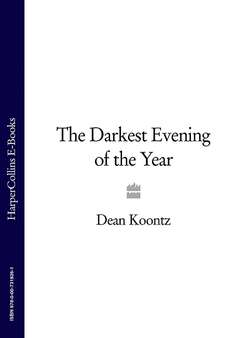Читать книгу The Darkest Evening of the Year - Dean Koontz, Dean Koontz - Страница 17
ОглавлениеChapter 12
Fire spawns fitful drafts in the still night, brief twists of hot wind that stir Harrow’s hair but dissipate behind him.
The people asleep in the house, if in fact anyone is at home, are strangers to Harrow. They have done nothing to him. They have done nothing for him, either.
They mean nothing to him.
He doesn’t know what they mean to Moongirl. They are strangers to her, as well, but they have some meaning for her. They are more to her than a mere medicine for boredom. He wonders what that might be.
Although curious, he will not ask her. He believes that he is safer if she thinks his understanding of her is complete, if she believes they are alike.
Flames engulf the back porch, and the sounds of consumption begin to arise from the front.
Moongirl’s hands are in the pockets of her black leather jacket. Her face remains expressionless. In her eyes is nothing more than a reflection of the fire.
Like her, Harrow has discipline of his intellect and of his body, but unlike her, he also has discipline of his emotions. Those are the three hallmarks of sanity.
Boredom is a state of mind akin to an emotion. Perhaps the emotion to which boredom most often leads is despair.
She seems too strong to be seriously discouraged by anything, yet she fights boredom with such reckless entertainments as this burning, which suggests that she dreads falling into an inescapable well of despair.
Laceworks of firelight flutter across the grass, and across Moon-girl, dressing her as if she is an unholy bride.
A light appears in the middle window.
Someone has awakened.
Sheer curtains deny a clear view, but judging by the murkiness of the light and by the amorphous shadows, smoke already roils in the room.
The house is pier-supported. Evidently, the flames writhed at once into the crawl space, a thousand bright tongues flickering, hissing poisonous fumes up through the floor.
Harrow thinks he hears a muffled shout, perhaps a name, but he cannot be certain.
Instinct, imperfect in the human species, will harry the rudely awakened residents toward the front door, then toward the back. They will find a deep wall of flames at either exit.
The moon seems to recede as the night grows bright. Fire wraps the corners of the house.
“We could have driven in another direction,” says Moongirl.
“Yes.”
“We could have found a different house.”
“Infinite choices,” he agrees.
“It doesn’t matter.”
“No.”
“It’s all the same.”
From inside, screaming arises, the shrill cry of a woman; and for sure, this time, a shout, the voice of a man.
“They thought they were different,” she says.
“But now they know.”
“They thought things mattered.”
“The way they took care of the house.”
“The carved cornice.”
“The miniature windmill.”
Now the character of the screaming changes from a cry of terror to shrieks of pain.
Sullen fire throbs inside, beyond the windows. The place has been tinder waiting to be lit.
Likewise, the people.
At the middle window, the sheer curtains vanish with a quick flare, like diaphanous sheets of flash paper between a magician’s fingertips.
In front of the house, the lonely two-lane road dwindles into darkness that even the dawn might not relieve.
Glass shatters outward, and a tormented figure appears at the middle window, in silhouette against the backdrop of the burning room. A man. He is shouting again, but the shout is half a scream.
Already the woman’s voice has been stifled.
The French panes do not allow an easy exit. The man struggles to twist open the lock, to raise the bottom sash.
Fire takes him. He falls back from the window, collapsing into the furnace that was once a bedroom, suffering into silence.
Moongirl asks, “What was he shouting?”
“I don’t know.”
“Shouting at us?”
“He couldn’t see us.”
“Then at who?”
“I don’t know.”
“He has no neighbors.”
“No.”
“No one to help.”
“No one.”
Heat bursts a window. Blisters of burning paint pop, pop, pop. Joints creak as nails grow soft.
“Are you hungry?” she asks.
“I could eat something.”
“We’ve got that good ham.”
“I’ll make sandwiches.”
“With the green-peppercorn mustard.”
“Good mustard.”
Spirals of flame conjure the illusion that the house is turning as it burns, like a carousel ablaze.
“So many colors in the fire,” she says.
“I even see some green.”
“Yes. There. At the corner. Green.”
Smoke ladders up the night, but nothing climbs it except more smoke, fumes on fumes, soot ascending soot, higher and higher into the sky.
